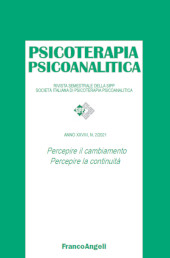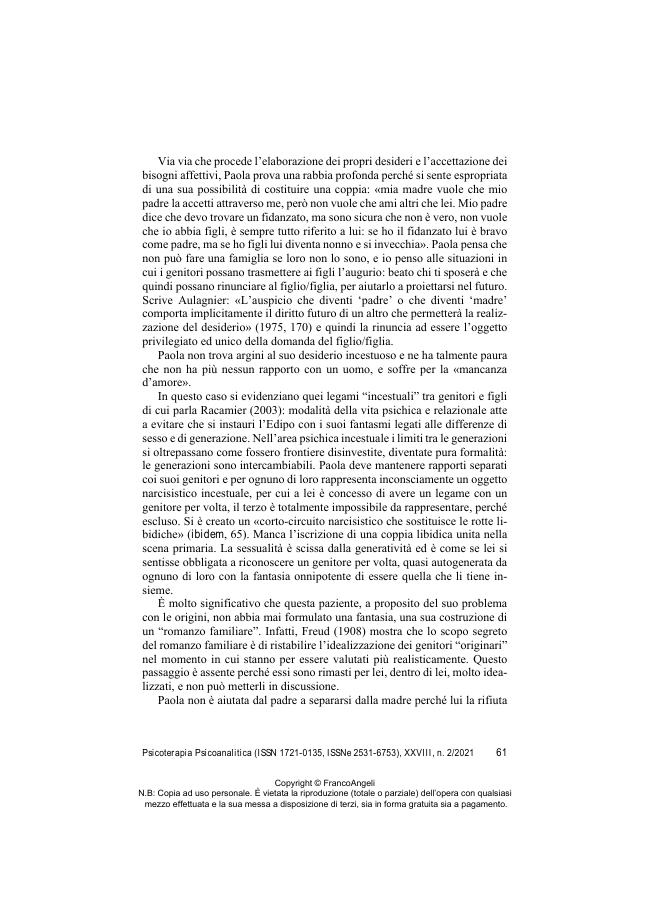Abitare il tempo tra continuità e cambiamento
52-69 p.
L'autrice si interroga sulla tendenza di alcuni pazienti a fermare il tempo in attesa che il passato cambi, e a vivere ogni cambiamento come una catastrofe, per lo scatenamento di angosce di frammentazione e di perdita della propria continuità di esistenza. Questa continuità è illusoriamente mantenuta fermando il passato in attesa che cambi. La difficoltà ad abitare la propria vita e proiettarsi nel futuro è collegata a una impasse nel processo di soggettivazione che nasce dal conflitto tra l'essere conforme ai desideri inconsci dei genitori e al desiderio di esprimere un proprio progetto, seguendo i propri ideali dell'Io. Il conflitto viene negato e non affrontato per la paura del proprio odio e la fantasia conseguente di far morire i genitori. Si tratta del conflitto identificatorio di cui parla Piera Aulagnier, fra l'essere identificato e potersi identificare, che se non risolto dalla mediazione dell'Io, fra continuità e cambiamento, inchioda il soggetto a una identificazione alienante.
Continuità coi valori e gli ideali del gruppo familiare e possibilità di uscire dal verdetto genitoriale e proiettare i propri ideali fuori dalla famiglia. Abitare quindi una genealogia, far parte di una catena generazionale, che in questi casi è bloccata, come se si dovesse restare figli per sempre, cloni dei propri genitori. L'analisi dovrà attivare una disidentificazione rispetto all'identificazione alienante che vive il soggetto, attraverso la funzione di rispecchiamento e di holding, coadiuvata dal setting, con la regolarità delle sedute, e con la sua funzione di terzo, che immette uno spazio fra simmetria e asimmetria, continuità e discontinuità. In particolare, l'analista dovrà tollerare momenti di impantanamento e, in alcuni casi, delle vere reazioni terapeutiche negative, soprattutto per la difficoltà a elaborare il lutto per ciò che non c'è stato e avrebbe potuto accadere ma non può avvenire.
In queste situazioni, a volte, sembra presente un dissidio insanabile più che un conflitto, del tipo mors tua vita mea, che blocca l'attività di pensiero e ogni lavoro psichico. L'analista dovrà lavorare molto sul proprio controtransfert, reinterrogando il suo desiderio rispetto al paziente e alla propria identità di analista. Navigando tra i diversi registri dell'analisi, potrà incontrare il blocco del proprio pensiero, il sentimento di impotenza a cui potrebbe reagire con intolleranza verso il paziente e con un eccesso di furor curandi. Si tratta in fondo di riuscire a mantenere integra la propria capacità analizzante, quel restare vivo di winnicottiana memoria. [Testo dell'editore].
The author questions some patients' tendency to stop time, while waiting for the change of the past, and to live every change as a catastrophe due to the triggering of distress of fragmentation and to the loss of their own continuity of existence. Continuity is illusorily maintained by stopping the past and waiting for the past to be changed. The difficulty to inhabit their own life and to be projected into the future is connected to an impasse in the process of subjectification that arises from the conflict between being in conformity with the parents' unconscious desires and the desire to express one's own project, following the ego 's own ideals. Conflict is denied and it is not handled by the patients, for fear of their own hatred and the resulting fantasy of their own parents' death. This is the identifying conflict borrowed from Piera Aulagnier's theory; it is a conflict between being identified and being able to identify oneself, that holds the subject to an alienating identification.
Continuity of family' s values and ideals; chance to escape the family verdict and to project your own values outside the family. That is inhabiting a genealogy, being part of a generational chain, which is blocked in these cases, as if one were to be a child for ever, a clone of her/his own parent. Analysis will need to activate deidentification, with respect to the alienating identification the subject is living, by means of the functions of mirroring and holding, helped by the setting, with regulated sessions, which assumes the role of "the third" allowing the introduction of some space between symmetry and asymmetry, continuity and discontinuity. In particular, the analyst will have to tolerate some moments of bogging down and, occasionally, also some real negative therapeutical reactions, especially caused by the difficulty in grieving, since there has not been any loss, it could not have happened and it cannot happen.
In these situations there seems to be an irreconcilable dispute sometimes, which blocks the activity of thinking and every psychic work, more than a conflict like that in the statement mors tua vita mea. The analyst will have to work hard for her/his contratransfer, by questioning her/his wish again with respect to the patient and to her/ his own identity of analyst. While navigating through the different aspects of psychoanalysis, she/ he will be able to deal with the block of her/his thinking, the feeling of powerlessness to which she/he could react with intolerance towards the patient and with excessive furor curandi. After all, it is a question of being able to preserve your analysing capacity; it is a question of staying alive according to Winnicott's point of view. [Publisher's text].
Forma parte de
Psicoterapia psicoanalitica : 2, 2021-
Artículos del mismo número (disponibles individualmente)
-
Información
Código DOI: 10.3280/PSP2021-002004
ISSN: 2531-6753
MATERIAS
KEYWORDS
- cambiamento del passato, continuità e discontinuità nel processo di soggettivazione, identificazione, identificazione alienante, disidentificazione, conflitto identificatorio, catena generazionale
- change of the past, continuity and discontinuity in the process of subjectification, identification, alienating identification, deidentification, identifying conflict, generational chain



